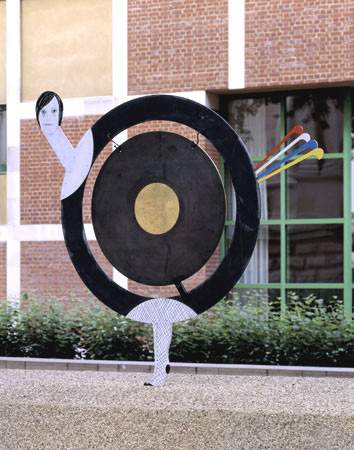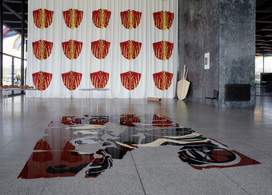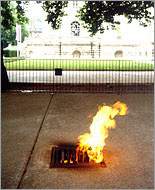Darian Leader
The press coverage of the Turner Prize tends to act as a barometer for media perceptions of what art is and what artists are. How do you feel about all the publicity around the prize – what the media grasps or doesn’t grasp about both art and artists?
Richard Wright
If you are talking about the media in the UK, I could probably only be negative about how art is generally discussed. But as an artist you have to accept the reality, and accept that this is the arena in which we are operating. The meaning in some ways is being controlled.
Lucy Skaer
I would agree that there’s probably not that much positive to say about general media coverage, but print journalism is better than TV and radio coverage.
Darian Leader
What are the main misconceptions that come through print journalism?
Roger Hiorns
The artist is coming from a place that is nigh on impossible to encapsulate in a 1,000-word review. It is a snapshot. So you either read it and get grumpy, or you ignore it.
Darian Leader
So you won’t learn anything new about certain public perceptions about what art or artists are supposed to be?
Richard Wright
The point is you get certain people who tell the public what they should think about art. So it’s more difficult to grasp what people really think. The thing I find the most difficult to deal with is the critics’ continual appeal to ‘common sense’, to our supposed natural understandings of things, which, in another way of speaking, is an appeal to prejudice and is therefore limiting. Most writers in the press look at the painting of a dead dog and say it’s a painting about death, and that’s as far as it goes.
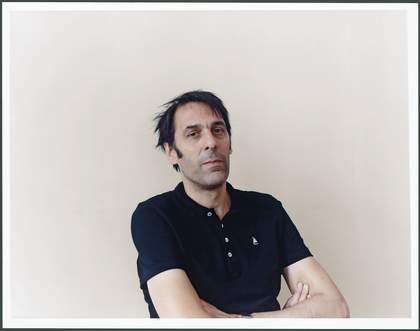
Richard Wright in his studio 2009
© Nigel Shafran
Roger Hiorns
I would agree there is a prejudicial level of subject that they – the critics – are going to feed to the audience. So you feel sorry that the audience is not treated seriously or given a well-considered position.
Enrico David
Journalists make audiences aware of the consumption qualities of what we do, because it has to be consumed in some way or another. I’ve read some stuff about my work in the past, negative and positive, and while I accept that the impulse to try to decipher ‘meaning’ is normal and understandable, that meaning ultimately remains anyone’s guess. It’s a reminder of how much what you do has got nothing to do with anyone really. Maybe it depends on what kind of day someone has had before he/she wrote a review, or how much they don’t like what you notionally stand for… It’s just so transient, so insignificant to me. At the end of the day, its drive is to turn everyone into customers.
Darian Leader
So, do you feel a pressure on you to provide a product?
Roger Hiorns
No, I don’t think we should feel pressurised.
Enrico David
It depends on your expectations and how important you feel it is to be understood. I actually enjoy reading negative things about myself because it feels like I can never really blame or be angry about what they say.
Roger Hiorns
I don’t carry the weight of writing or the weight of popular judgment within the studio. It’s an interesting question simply because it seems to have revealed our hang-ups about a problem that obviously all artists face. Some people get wounded by reviews more than others. Some just don’t read them.
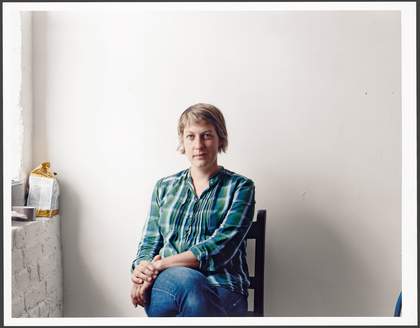
Lucy Skaer in her studio 2009
© Nigel Shafran
Lucy Skaer
I think the media format is not really ideal or appropriate for talking about things that don’t have a clear story in them. When people interview me, they want to talk about how long it takes to make the work, but that doesn’t reveal anything. Narrative angles are not a good way to explore work that’s maybe ambiguous or not quickly understood.
Darian Leader
Do they make you feel that part of your job is to provide an insight into the work?
Lucy Skaer
I would like to do that where it is possible. I don’t want to be cagey and not communicate something about the work if I feel I can. But I don’t think the direction that interviews usually go in is helpful for that. In my work I’ll actually try to stop direct meanings, because that’s not what I’m interested in.
Richard Wright
I tend to think misunderstanding is something that you would want to avoid. But it is inevitable – it is therefore something that you have to work with, it is a kind of material.
Darian Leader
Do you think meaning itself is a useful concept for thinking about work?
Enrico David
I certainly don’t. From an audience point of view, I see the interest in the relationship between the artist and the work in terms of meaning as anecdotal, like gossip. I would like to think that the work can stimulate viewers’ faculties to question their own codes of meaning, instead of trying to guess mine.
Richard Wright
I think you are saying that in a certain sense you know that you’re powerless to communicate with the audience and what you are doing is for yourself. If someone gets something from it, then that’s a nice accident. I do think that this is how things work, and I don’t think I would intend a project to direct the audience towards a specific conclusion. Part of the reason for my working with certain gestures or materials is that they are outside the territory of being read in a conventional way. But in spite of being aware of existential uncertainties, I’m as much interested in what people have in common as what they don’t. And so I do assume the possibility of communication.
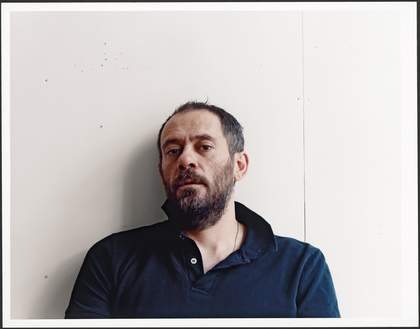
Enrico David in his studio 2009
© Nigel Shafran
Enrico David
It is interesting to see what people are willing to admit they have in common because there are a lot of assumptions that art over the past twenty years has developed into a culture of maintenance of positions that are proposed as new positions. Almost like devices that are there to reassure everyone about what is expected from art. And I think that brings the sense of the individual responsibility in the presence of the potential for a shared experience to be actually truly shared. Fear of uncertainty and doubt comes with trying to be emotionally responsible and for me it is intrinsic to the experience of looking at art, and in particular what we are seeking from it, if anything, other than just a nice day out. What makes me interested in taking part in the Turner Prize is, besides the absurdity of its competitive aspect, its ridiculous, cartoonish popularity.
Richard Wright
Which ironically turns out to be a more real arena in a way. It is quite outside the rarefied world of the art gallery and many people will come, perhaps with no information – perhaps this gives it a more true edge?
Darian Leader
What form of participation would you expect from your audience?
Enrico David
Expressive dancing of shapes?
Lucy Skaer
I always make my shows bearing in mind how the viewer will walk around them. I try to orchestrate that experience in a way that will make the work more open.
Roger Hiorns
When I was working on the Seizure project last year, I had this desire to step back as far as possible from the actual viewer. I was concerned about “contamination” from the viewer, from their relationship to something that I’d made. That I had no interest in their experience of the work.
Enrico David
I don’t think too much about the audience, because if I do, I feel antagonistic towards them. I have no desire to entertain or be appreciated. I am searching for something which makes me feel reassured within myself, regardless of or even in spite of the audience.
Richard Wright
I work from the principle that if paintings have changed me, then it is possible that they would work on someone else. I begin by trying to convince myself that I am the audience, if you like. Maybe this supposes empathy, but the idea that I am trying to create meaning is not one that I really accept. It is more of a question of participating in meaning.
Darian Leader
You said a very beautiful thing when you defined a work of art as being like a worn step.
Richard Wright
I think I said it was worn in both senses of the word – from you walking on it, but it’s also from being worn like a garment. Which has to do with being displayed or carried, but also contains the sense that art changes from being used.
Darian Leader
So there is a tension between Roger’s view and your view on that – where it seems you are actually trying to change the framework and meaning that a viewer might bring…
Roger Hiorns
Well, you can never pre-empt what the viewer thinks, that’s just not part of my project.
Enrico David
But isn’t changing about finding things in yourself through experiences?
Richard Wright
I do know that I’ve been changed by things such as a piece of music that I heard and carried with me. But it would be inappropriate to say that I am trying to change someone, because I don’t see it as being a positive act, in the sense of ‘here is the lever’. When I approach a painting from 400 years ago, much as I might know some things about it, I can’t know everything about it, but I can still use it, and it also uses me.
Roger Hiorns
I agree that we are grouping our stimuli so that we don’t have a common experience in life, but our stimuli are going to shape what we do. What artists are trying to do is piece together and then present their stimuli. I think that’s why you have this very strange relationship with the public. As an artist, sometimes you forget you’re offering a first-time experience of what your work is to them. That can be jarring or maybe prescriptive…
Enrico David
To me the concept of the audience feels like a fiction, it is so malleable and impermanent. I’m aware of the potential exposure to a collective experience in making the work. Everybody’s looking for that sense of reassurance and permanence and stability in what things actually are and mean in art. That in itself is something that makes me antagonistic towards the audience, because it is not part of my experience. I don’t feel there is a goal to reach or a position to confirm.
Roger Hiorns
But do you think there are artists who do have positions that they need to confirm? Do you feel that there is an end to an artist’s work?
Enrico David
Yes, if there is a very strong impetus to try to define and understand what you do. That can rub off on you, and you can end up finding yourself standing for something you didn’t mean to, even without being conscious of it. Maybe it gives you reassurance about having found a role in society or in life. I don’t feel that that’s something I necessarily strive for. But I also think it is okay to expose the work to the dangers of misunderstanding.
Darian Leader
Some commentators on contemporary art and on the Turner Prize talk about what they see as the apolitical selection of artists today – seen as a more general symptom of the apolitical in contemporary art. What do you think about the question of politics and art?
Richard Wright
I don’t think it’s possible to be apolitical in art, or in most things. Like the dead dog, this aspect of things tends to be seen at a very obvious level. But it is possible to act politically by simply refusing to eat something, or by insisting on saying something that is not being said. Also, I reject the idea that an artist should tell people how to live.
Roger Hiorns
I agree with Richard that there is a certain inherent political-ness to any making activity. But I don’t know if you can steal the protest away from the main arena and use it as art, just because art allows you to re-frame it somehow, and that may take away its legitimacy to be authentic. In a sense, legitimacy is where the front line of political activity should remain.
Lucy Skaer
I think art in general leads to a broader way of thinking about things, and in some ways a kind of unlearning of the meaning of things. And that’s why in some way I think it is incompatible with the media as we were saying before.
Enrico David
It depends on what you mean by political. What is the political ambience that an artwork can generate, without exploiting the clichés and rhetorics of any ideological agenda already expressed by other media? I think that there are certain canons or criteria by which work is judged political. For instance – what does it mean today to make “queer art” or an overt art of resistance in terms of socialism? To me, trying to represent the specifics of your experience, as awkward and alien as it might manifest, is by its very nature political.
Richard Wright
I feel that what matters is not what we can see, but what we are allowed to see. I get angry about how art is discussed in the press, because for me this generally takes the form of an appeal to common sense and tends to involve a kind of collective ridicule. It categorises art as a sort of harmless activity alongside leisure and sport… So I feel that my role – if I have a role – is to try to refuse this in some way, by acting in a way which perhaps allows another possibility to exist.
Roger Hiorns
If art is political, it has to be used in some way. I think that’s why they have tried to integrate politics into art – to find a use or make it relational. And that integration is not successful. I do agree that theory and art are the same and inseparable at this point, and that we need to clear a distinction between a critical theory and praxis, against simply reacting to unbalanced governmental politics. The latter encourages simply the same old moans and a regurgitation of signs that repress any sense of progress.
Richard Wright
It’s become impotent for that reason, because it just becomes something to observe and that is all.
Darian Leader
So what other possibilities might there be?
Roger Hiorns
Well, we do art because there isn’t any…
Lucy Skaer
There’s probably no other path than art for me to take because I always make things. But I don’t think that’s a particularly conscious decision. You could say the same for music, literature, science or mathematics.
Darian Leader
The place you occupy as an artist is interesting here. The place you’re in will have effects on how people interpret what you do. People would watch the way Wittgenstein tied his laces as if that would shed light on some philosophical problem.
Roger Hiorns
I guess because artists are engaged with meaning, because you are dealing with a philosophical question which fundamentally can’t be answered, or shouldn’t be. Then of course you are under scrutiny to offer suggestions on what is meaningful.
Darian Leader
Gavin Turk said that the most successful art is the art that is misunderstood by the greatest number of people.
Richard Wright
It is a truism, isn’t it, because in a sense all art is misunderstood. I think we’re coming from different positions, because I feel that I have to work with the idea that the audience and I have something in common. But I also naturally expect to be misunderstood.
Lucy Skaer
If I go and see a big show of an artist’s work, I find that the language is actually quite understandable and intelligible on many different levels. I think that there is a lot to be shared directly between the artist and the audience. Another way to interpret “misunderstanding” is as the generation of the most spin-off or the most new unpredicted thought.
Darian Leader
Do you disagree with that Enrico, because for you there isn’t a shared space?
ENRICO DAVID The only shared space is based on at best the shaky assumption that we are all willing to take responsibility for our own feelings. Yeah, I want a shared space of course, and there is always the possibility of one, but it’s not something I depend on. But how much do you give a shit about making great art, anyway?
Darian Leader
Not great art, the most successful art.
Enrico David
Yeah. How important is it, or what does it mean to us, successful art? Successful in relationship to what?
Darian Leader
In the sense of producing social change.
Enrico David
But social change is driven by so much that is happening at any given time in history. Just look at the results of the European elections. Okay, if that’s the social change that I’m part of, then I’m off to the shops.
Darian Leader
Can artistic practice have any effect on that?
Enrico David
Of course it’s a nice idea, but for me, that kind of change could only occur as the fallout of how effective my work is to my experience.
Roger Hiorns
It’s a troublesome argument. Some people are just unaware. I think the possibility of the lone artist travelling into a certain sort of wilderness to find a certain sort of reality or a lost truth has been divorced from the process of the actuality of making art.
Richard Wright
Perhaps we do need to turn away from the world in order to make things?
Roger Hiorns
But we also have a sort of dogmatic position that we have to work within the structures of whatever ‘ism’ we seem to be in. We all must be encouraged to resist this dogma of course, and naturally, but I can’t speak for the translators, or other artists, on the level of their acceptance of the status quo.
Darian Leader
If the work fits something that’s already there, it hampers the possibility of change. Then again, look at the way Surrealism was taken up by the advertising industry.
Lucy Skaer
If you’re saying you can only understand work if you know the ism it’s in, then I think that is completely not true.
Richard Wright
I agree. I think I would operate from the assumption of no knowledge, obviously, because I don’t understand art.
Roger Hiorns
There’s no universality in art. There’s a world out there which actually is ascribing or aspiring to a certain universal position, but art resists this movement, art is one of the final places where you can resist any sort of universal reading of how things could be. An artist has constantly to resist a kind of coercion.
Darian Leader
Reinvention can be a way of resisting coercion, but there are also artists who work with a very limited set of materials or methods – think of Morandi.
Roger Hiorns
Yes, but has that level of acceptibility to repetition become part of your psyche? At the beginning I used to think there was a sort of obsessive compulsiveness to the way I always wanted to repeat activities – to understand through repetition. I became self-aware in the character of process, I look for ways of explaining how ritualistic behaviour can be rationalised as simply compulsive human or animalistic behaviour, and this transference to logic is a key activity in my rational position and disenchantment from anything ‘other’. I think between all of us here there is a sense of the possibilities in the ritualistic and the obsessive rational or otherwise, directions we psychologically take eventually to manifest a three-dimensional object. An object that is a projection of our minds; our minds boundary is unlimited in this sense.
Richard Wright
There are many things that can stop you, and one of those things is people liking what you are doing. You want to be liked and this can make it difficult to change. I’ve always had the feeling that I would like to approach the work as if I had never worked before, but at the same time I have the desire always to want to do it with the same thing, but this is not the same as repetition.
Darian Leader
Do you think the art world is more open in terms of allowing change?
Lucy Skaer
Art is very open to artists to make whatever they want, and there’s the ability to self-organise and work in unexpected, not necessarily mainstream ways. But maybe at some point that becomes subsumed by being included in an ism, or by the market.
Enrico David
We like to be liked, but I think there is also this position of being liked almost in your worst possible light. If there is any change that occurs in my work sometimes, it is in trying to accept myself in that position of being at my most uncomfortable, and yet in the hope obviously that along the way I’m also liked. I really felt like I had no talent and there was nothing I could show anyone that was of any value in terms of skills or of a particular kind of cultural enlightenment. I was just gathering together things that felt like they could make me acceptable.
Lucy Skaer
I feel more detached from my work. When someone’s looking at it, I don’t feel they’re looking at me and judging me. Probably for me if there was a work that would really fail, it would be because it was too polite or too consumable.
Darian Leader
Gombrich said it was far less interesting to reflect on why you like a certain work than on why you might really dislike one. It is when a work produces a negative reaction that you ought to start thinking about it.
Richard Wright
I’m not sure that’s always true.
Lucy Skaer
That is a bit pessimistic.
Darian Leader
Do you never have a very strong hatred towards the work?
Richard Wright
It’s certainly more uncommon for me to like things. But I don’t necessarily think they should become more interesting because I don’t like them.
Darian Leader
In psychoanalysis, if a patient says everything is moving along well and they really like it, you know that nothing is happening. If they say that they really hate it, that they really hate their analyst, at least you know something is moving. And with art?
Lucy Skaer
But that’s art as a person; I mean, it’s a profession.
Roger Hiorns
Do you see it as a profession?
Lucy Skaer
Yes. Just in the very simple way that it’s what I do with my time. But I’m not happy with the idea that you can read the person and gain insight into the work in that kind of biographical way. So then I would like to make a kind of separation between myself as a person and what I do…
Richard Wright
I operate from the principle of abhorring professionalism.
Darian Leader
But aren’t more people being confronted with something they can’t understand about themselves through encountering their work? So the relation isn’t between the viewer and the artist’s psyche, but between the viewer and their own psyche?
Lucy Skaer
Yeah, or the viewer and the world. I mean, I don’t think that it always has to be a kind of inward-looking contemplation.
Enrico David
I never thought of working in that way – you know, to become really introspective. I’ve far from actually ever seen it as a profession. It was more like the curiosity of seeing what I could do that led me to unravel this stuff that has happened. I’ve got to the point where I think that’s almost my sole purpose in making what I make. I wouldn’t want to professionalise what I do. It should have always been a hobby, but it kind of became a profession. It was never planned.
Roger Hiorns
But do you feel it is something you could have left at a certain point? That you could drift away and do something else for a few months?
Richard Wright
The thing I admire most about Rimbaud is not his poetry, but the fact that he gave up poetry. It brought him a certain glory and attention, but he rejected this. I like the idea of refusing the contract. I think there is a paradox. Of course you want to be liked, but you mostly hate being liked. But I do care about an audience. I agree with what Nietzsche said: ‘The poet doesn’t want to be read he wants to be learned by heart.’ I believe that is where you want to be, otherwise there is no point.
Lucy Skaer
I wanted to ask about the specific way that you make things, because it’s quite unlikely that someone could see a huge overview of your work as it’s always in specific places and doesn’t travel.
Richard Wright
I think this aspect of remembering something is of great interest to me…
Lucy Skaer
But is the obliteration of the work an unfortunate by-product of that?
Richard Wright
Not at all; speaking about art in general, the most important work to me is the one that I can imagine here right now. This possibility of being able to re-see is almost more important than the work itself. I began with a feeling that there were too many things – that I was haunted by dragging these things around from one studio to another, particularly those that I just got sick of or embarrassed by. There is something redeeming in the fact that the work is erased. Perhaps you
can remember it better than it really was.
Enrico David
That’s funny because I sometimes feel that I’m growing to enjoy the cumbersome, lumpy reminder of how wrong I got things. I really love to have my face rubbed in it. You can’t get away from the physical embarrassment of the thing. Sometimes it is as if I’m physically dragging these bits and pieces – all this stuff – behind me, as if it were a massive trail.
Richard Wright
I think what you’re saying is brave, because these things come back to haunt me when they’re not there.
Enrico David
Since the Turner Prize nomination I’ve been thinking – do you imagine yourself being a better artist? How important is it for an artist to think about having to try harder?
Lucy Skaer
I don’t have much choice about the next thing that I make.
Darian Leader
And to what extent do you have the idea that a work is finished?
Lucy Skaer
For me, it’s finished when it gets shown. I make work specifically for the scenario in which I’m going to show it. A lot of the actual orchestrating of what you see is done in the installation.
Roger Hiorns
I have a very good idea of what it’s going to look like when it’s finished at the beginning, and I don’t ever deviate. I put a group of systems in place, some aesthetic. You extricate yourself from your working processes, from your aesthetic decisions. Then you can look at the work as objectively as any viewer. Some of the pieces would finish themselves. They become almost illustrations of what you imagine them to be at the end, so it’s quite efficient.
Richard Wright
So you’re not surprised by the result?
Roger Hiorns
No. And I’m quite happy never to be surprised. I don’t want to sit in the studio and feel that I’m learning how to make art. I want just to go to a studio, get what needs to be done and then go to the next place, because my stimuli happen elsewhere perhaps, or the way that I want to work is happening somewhere else. So I’m not that interested in a progressive nature of how aesthetics can be developed.
Darian Leader
It’s a radical view.
Roger Hiorns
You’re taking objects out of circulation. It’s almost like a national park as artwork. You’re taking all of these physical objects and putting them into another place which is a protected state.
Lucy Skaer
Is that how you saw your work Seizure – that it took the condemned flat out of circulation?
Roger Hiorns
Yes, it was one of the positions. Crystallisation is a way of claiming something almost, because you’re using that material to claim a certain ideology or position – like a material colonisation. You can colonise things with your mind, or your mind can be colonised. Artwork is a colonisation of your mind to some degree. If you go into it wholeheartedly and understand an artist very deeply, then they colonise you: they understand and you understand something differently or from a different position. It’s nice to see this also done physically, with materials actually changing a situation. Both fundamentally and irreversibly. I would say it is important to exhibit the human imagination in its current phase, to show where the imagination is moving towards.
Darian Leader
Could you say something about finishing?
Enrico David
I start working in a quite impulsive way, and I’ve learned to leave a lot of things open to the end. If I’m working on an image on paper or canvas, I think it’s pretty much clear when it’s finished. But there are exceptions. The bedroom piece I made was done in terms of thinking of it as finished, but because I couldn’t actually see it until I’d installed it, there were a lot of unaccountable things that I wasn’t quite sure how to resolve until I got there.
Richard Wright
I am a person who would always come back and want to change something if that were possible. In a way, I’ve created the system that doesn’t allow that to happen. A solution!
Darian Leader
Do you think that nowadays there is more or less freedom conceptually? In the early 1950s in terms of academe you could write a book with ideas – nowadays there are new criteria of what counts as evidence, so most ideas are bad news.
Richard Wright
There are more controls definitely.
Lucy Skaer
But aren’t there more opportunities – for example, with the internet?
Richard Wright
I think there are more controls in terms of what is accepted as information. Yes, you can write what you like – that is what, in a way, this whole discussion is about. Anyone could say ‘I am an artist’. But what matters is what other people think – whether or not what you say is allowed to mean something… I do think that it’s more problematic to be free now. Maybe because it seems easier?
Darian Leader
You’re obliged to be free, it’s an imperative to be free, but the very mechanisms and structures that tell you to be free block you from being so. The internet really only gives people the illusion that their voice counts…
Enrico David
I think your freedom is a way to state your authority. There is a much wider forum for that authority to manifest itself in many ways today, not just because of the internet. The art industry has actually been discovered as a real job opportunity for a lot of people. I was in art school between 1990 and 1994, when it was still quite unclear how successful the YBAs would become. But now, fifteen years later, everyone can see what their success has meant in terms of economics. I remember as a tutor at the Slade there were those who would apply and ask what their job prospects were going to be at the end of their degree.
Roger Hiorns
When I was at Goldsmiths, you felt that you were feeding some a kind of result system at the end of it. But that was perfectly acceptable – there was carte blanche with the institution to try these experimental, psychological or theoretical positions out, to get all these tutors from different disciplines and subject you to a rationale and see what the result would be.
Darian Leader
This point comes back to the misconceptions about art that you find in the newspapers – that you discover an artist by discovering works, rather than the trajectory which has made the works emerge in the life of the artist. It’s the idea that someone can make a lucky find: you walk along and suddenly see an amazing work, and then you can publicise it and the artist will become famous overnight.They used to make comedies about that kind of thing.
Richard Wright
As in Tony Hancock’s The Rebel.
Darian Leader
Yeah, exactly, but now that’s being even more institutionalised.
Richard Wright
But it’s just another way of making art irrelevant. And that is what we must resist. That is political.
Roger Hiorns
Is it not all about the separation between values and the object? Do you feel how the economy within the art world has a sort of homogenising aspect to it? For too a long a period we have had this rather soft idea of art, because it’s been based on what the customer wants. Then we have all these pervasive ideas suddenly flowing back, which are basically reflections of the collector or the curator, rather than the artist.
Richard Wright
It is a difficult situation for the artist to negotiate, and I think that is possibly one of the biggest changes that we may face.
Roger Hiorns
Yes, because we’ve had new-ageism come back, we’ve had agnosticism come back; we’ve got these really soft agendas coming into art. It is something that’s been troubling me for a while. To me, all weak subjectivity. The ethical thing is to give up art publicly.

